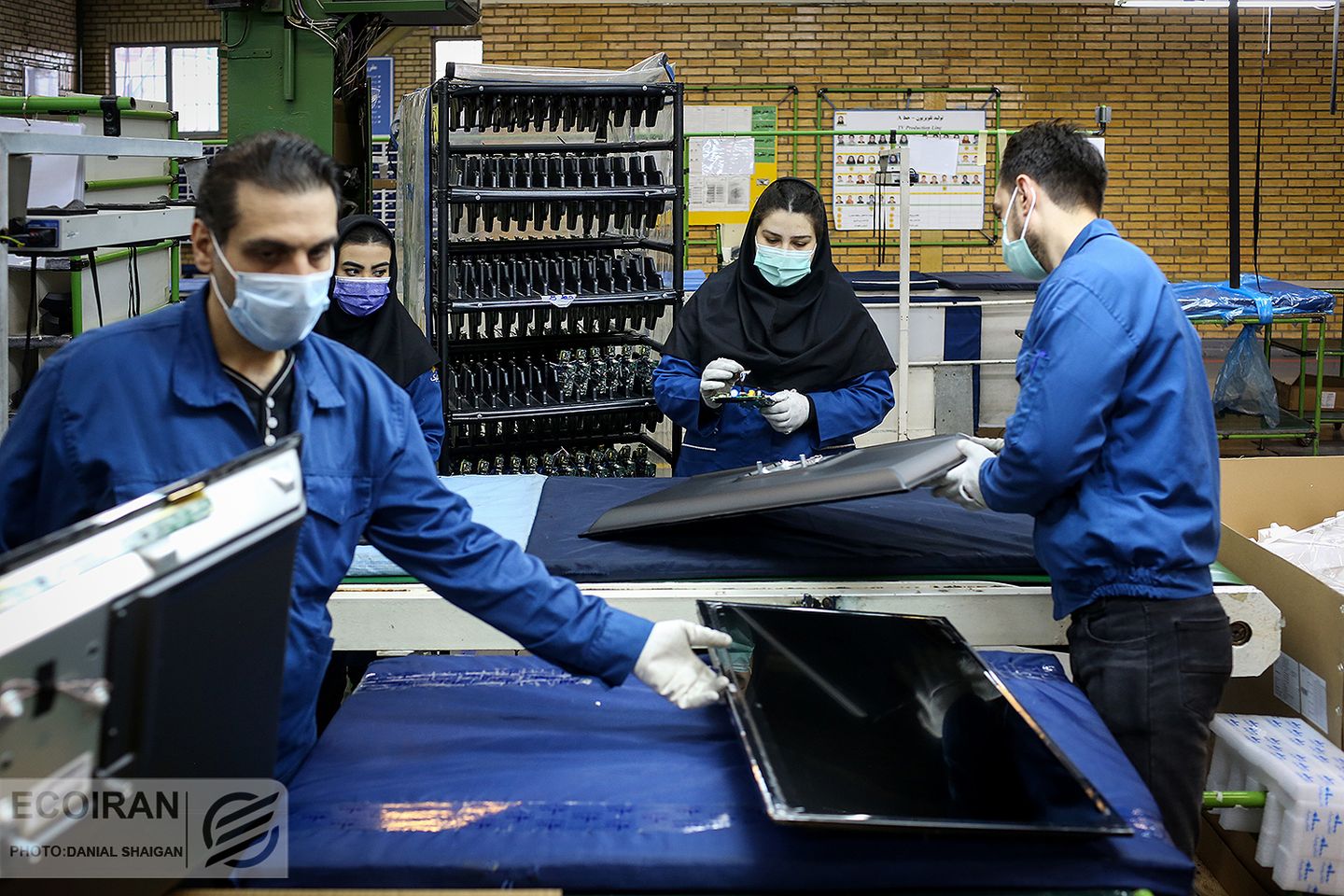A while ago, the Iran’s Deputy Minister of Industry, Mine, and Trade (MIMT) announced the closure of 6,900 industrial units in the country’s industrial towns.
One of the most critical criticisms from activists and economic analysts, aside from the systematic corruption of relevant institutions, is the lack of a proper understanding of the needs and prerequisites of production in government economic programs. This lack of understanding has led to the implementation of inflationary policies and the creation of numerous obstacles for the productive sector of the economy.
During the catastrophic spread of poverty in Iran, women are grappling with serious and systematic inequalities in employment. According to official statistics from the Statistical Center of Iran, in spring 1400 (2021), 4.2 million women were recorded in the active economic population, which is equivalent to 14.1 percent. According to this center’s indicators, “economically active” refers to employed individuals and those seeking work; meaning, these statistics also include unemployed women looking for jobs. On the other hand, housewives, retirees, students, and all those who have given up on job searching are counted as “economically inactive” and are not included in the unemployed population.
The Statistical Center of Iran estimated the employed female population in spring 1400 (2021) at 3.6 million people (equivalent to 11.5 percent), which is a decrease of 168,000 people compared to the winter of 1399 (2020). According to statistics from the Vice Presidency for Women and Family Affairs during Rouhani’s government, out of 4.32 million employed women in 1398 (2019), about 15.3 percent lost their jobs in 1399 (2020), and the ratio of women to men who lost their jobs in 99 is about 9 to 1. According to the same report, the unemployment rate for Iranian women is three times the global average. Another report from the Statistical Center of Iran suggests that the percentage drop in the number of employed women in Iran from autumn 1398 to autumn 1399, during the first year of the COVID-19 pandemic, was almost 14 times that of men. According to statistics registered in government news agencies, 70 percent of employment in Iran consists of informal jobs.
Insecurity, exploitation
People in informal jobs are more vulnerable, and women working in this sector are among the most vulnerable workers, facing numerous problems. They often lack insurance coverage, are deprived of medical services and health insurance booklets, have no retirement or unemployment insurance benefits, and are not covered by protective laws or safety and labor regulations. Exploitation, exposure to sexual and gender-based violence, facing sexual extortion by employers who threaten their jobs and wages, and being forced to provide unsigned checks and promissory notes are among the most significant problems faced by women who prefer such employment to unemployment.
Self-employed women, such as street vendors in public spaces and subways, suffer from social and job insecurity, including sexual violence and occasional arrests, as the space for employment becomes increasingly restricted day by day.
Women working in family businesses may also be easily exploited by their male relatives and often have to submit to any form of exploitation and abuse.
Women, constituting half of the population, have a direct impact on the development of society. In macroeconomic infrastructural approaches, besides the lack of expertise and proper understanding of production prerequisites in government economic programs, what is never considered is the role and needs of women. In the systematic gender-biased policies rooted in the fundamentalist regime of the Islamic Republic, due to this discrimination and exclusionary structure, all levels are considered to be of a single gender, and the dominant phallocentric (male-centric) discourse fundamentally prevents the presence of women and queer individuals in important jobs and decision-making regarding economic programs.
In such a structure, initially, women and the queer community lose access to decision-making structures and significant jobs, and subsequently, due to the same gender-biased structure, they are marginalized and turned into “cheap labor.”
With the closure of factories and large industries, the most vulnerable groups are the first to feel the pressure of losing their jobs. This means that the hegemony of cisgender heterosexual men, which has intertwined the industry with a male-centric discourse, for its survival in a crisis situation, firstly eliminates socially marginalized groups by the theocratic patriarchal regime: women, sexual and gender minorities, religious minorities, and people with disabilities.
Thus, in these circumstances (closure of industries), these social groups, who previously due to the discriminatory structure were paid less for equal work compared to cisgender non-disabled heterosexual men, are the first groups to be forced out of their jobs.
The misogynistic and woman-hating regime of the Islamic Republic, which solidified its foundations of domination and exploitation by systematically oppressing women and marginalizing demanding and oppressed social groups, and by granting privileges in exchange for silence and complicity to another social group (cisgender non-disabled Shiite men from the center), has always based its policies on driving women back into the homes and making them passive and cutting off their access to education, economy, employment, and resources. In such an environment, women, after being forced out of jobs in the industrial and production cycle, are driven into the corners of their homes. Women, who are called “housewives” in a patriarchal culture, are exploited on multiple layers, and all their time and energy must be devoted to “reproductive” housework, for which they receive no form of payment or salary, or benefits that privileged men and women enjoy, such as insurance and retirement benefits and other services. Their hard and exhausting work becomes invisible, and they themselves become isolated from social participation.
The Systematic Oppression
and Subjugation of Women in the Workplace
The situation of women in the labor market, home, and family is interconnected and part of a comprehensive social system derived from male/patriarchal order and an ideological and theocratic government that mandates women to be subservient to men. The patriarchal culture, which considers housework and childcare to belong to women even when they work outside the home, is part of this systematic exploitative rules.
Typically, men remain in the workforce from the time they enter the job market until retirement. Men’s participation in social matters is almost unaffected by any life stage. For instance, the level of education, marital status, and place of residence do not significantly impact their career lifespan. In contrast, women’s participation in social affairs is discontinuous and fragmented, influenced by cultural constructs and an exploitative view. They enter and exit the job market several times throughout their lives, and their participation pattern is affected by gender, life changes such as marital status, permission from father and later husband, pregnancy, the number of children, responsibility for child care, financial exploitation, and gender-based sexual violence from the power structure, as well as the enactment of various misogynistic government laws.
The misogynistic Islamic Republic has been normalizing discrimination for years by enacting laws that contradict women’s fundamental rights. As long as the gender inequality and discrimination stemming from the belief in the inferiority of women, which has a historical and systematic form, prevent equal access for these social groups to employment, resources, and the economy, and as long as the male hegemony in the patriarchal system creates and perpetuates gender role differences through socialization processes, beliefs, and attitudes related to gender role differences, women, as a significant part of the workforce, will always be exposed to instability, insecurity, psychological and physical harm, and various forms of oppression.


The deputy of Islamic regime president in women’s affairs, by stating that ‘we have defined the indicators of gender justice,’ said:
‘We do not believe in equality and believe that equality is oppression to women and there should be justice for them.’
Gender Gap in Iran
The latest report on the gender gap in countries around the world for 2023 has been released. The bottom five countries include Pakistan at rank 142, Iran at rank 143, Algeria at rank 143, Chad at rank 145, and finally Afghanistan at rank 146. The top nine countries include Iceland, Norway, Finland, New Zealand, Sweden, Germany, Nicaragua, Namibia, and Lithuania, which have closed at least 80 percent of the gender gap. It will take 131 years for the world to achieve full gender equality.
This year, the 17th report of the Global Gender Gap Index has measured gender equality in 146 countries and provided a basis for robust cross-country analysis. Additionally, the examination of a subset of 102 countries that have been included in each edition of this index since 2006 offers a large consistent sample for time series analysis. The Global Gender Gap Index measures scores on a scale from 0 to 100 and scores can be interpreted as the distance traveled towards equality (i.e., the percentage of the gender gap that has been closed). Cross-country comparisons show the most effective policies for reducing gender gaps.
Key findings of this report include the 2023 index results, analysis of trends on the path towards equality, and a deep dive into data through contributions from new metrics and contextual data.
.
My journey in creating this space was deeply inspired by James Baldwin’s powerful work,
“The Fire Next Time”. Like Baldwin, who eloquently addressed themes of identity, race, and the human condition, this blog aims to be a beacon for open, honest, and sometimes uncomfortable discussions on similar issues.
Support The Fire Next Time by becoming a patron and help me grow and stay independent and editorially free for only €5 a month.
You can also support this work via PayPal.
.











What you think?